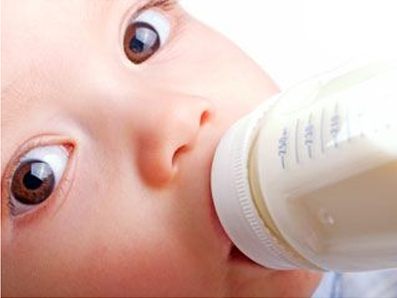
4.Changing Baby Food Formula Doesn't Prevent Type 1 Diabetes in Children |

![]() The long-awaited results from the first large international trial to try to prevent type 1 diabetes shows that modified baby formula, in which cow's milk proteins have been split, does not prevent type 1 diabetes in children with genetic risk factors for the condition. The findings, from Children's Hospital of Pittsburgh of UPMC, the coordinating center for the U.S. arm of the study, were published in the Journal of the American Medical Association.
The long-awaited results from the first large international trial to try to prevent type 1 diabetes shows that modified baby formula, in which cow's milk proteins have been split, does not prevent type 1 diabetes in children with genetic risk factors for the condition. The findings, from Children's Hospital of Pittsburgh of UPMC, the coordinating center for the U.S. arm of the study, were published in the Journal of the American Medical Association.
![]() Previous studies have reported that early exposure to complex foreign proteins, such as cow's milk proteins, may increase the risk of type 1 diabetes in young children with genetic risk for type 1 diabetes.
Previous studies have reported that early exposure to complex foreign proteins, such as cow's milk proteins, may increase the risk of type 1 diabetes in young children with genetic risk for type 1 diabetes.
![]() In 2002, the research team for TRIGR (Trial to Reduce IDDM in the Genetically at Risk), led in the U.S. by principal investigator Dorothy Becker, M.D., Professor of Pediatrics at Children's Hospital and the University of Pittsburgh School of Medicine, started a large-scale study of 2,159 infants with a family member affected by type 1 diabetes and with genetic risk for type 1 diabetes to find out whether delaying the exposure to complex foreign proteins such as cow's milk proteins would decrease the risk of diabetes.
In 2002, the research team for TRIGR (Trial to Reduce IDDM in the Genetically at Risk), led in the U.S. by principal investigator Dorothy Becker, M.D., Professor of Pediatrics at Children's Hospital and the University of Pittsburgh School of Medicine, started a large-scale study of 2,159 infants with a family member affected by type 1 diabetes and with genetic risk for type 1 diabetes to find out whether delaying the exposure to complex foreign proteins such as cow's milk proteins would decrease the risk of diabetes.
![]() After breastfeeding, infants were either weaned to a special formula (extensively hydrolyzed casein formula), with the cow's milk proteins split into small peptides (small pieces of the protein), or a regular cow's milk-based formula with intact cow's milk proteins. The children were followed up for at least 10 years to determine which children developed diabetes.
After breastfeeding, infants were either weaned to a special formula (extensively hydrolyzed casein formula), with the cow's milk proteins split into small peptides (small pieces of the protein), or a regular cow's milk-based formula with intact cow's milk proteins. The children were followed up for at least 10 years to determine which children developed diabetes.
![]() At 11.5 years of follow up, weaning to an extensively hydrolyzed casein formula during infancy did not result in a reduction in the incidence of type 1 diabetes compared to regular, intact cow's-milk-based formula.
At 11.5 years of follow up, weaning to an extensively hydrolyzed casein formula during infancy did not result in a reduction in the incidence of type 1 diabetes compared to regular, intact cow's-milk-based formula.
![]() "After more than 15 years of effort, this study puts to rest the controversy regarding the potential role of cow's milk formula in the development of type 1 diabetes," said Becker. "This once more shows us that there is no easy way to prevent type 1 diabetes. Accordingly, there is no evidence to revise the current dietary recommendations for infants at high risk for type 1 diabetes. We need to chip away at our research efforts around the world to find interventions that may change the pre-diabetes course. Ongoing work of our study is doing just that."
"After more than 15 years of effort, this study puts to rest the controversy regarding the potential role of cow's milk formula in the development of type 1 diabetes," said Becker. "This once more shows us that there is no easy way to prevent type 1 diabetes. Accordingly, there is no evidence to revise the current dietary recommendations for infants at high risk for type 1 diabetes. We need to chip away at our research efforts around the world to find interventions that may change the pre-diabetes course. Ongoing work of our study is doing just that."
For enquiries info@jothydev.net.
Please visit: jothydev.net | research.jothydev.com | diabscreenkerala.net | jothydev.com/newsletter
